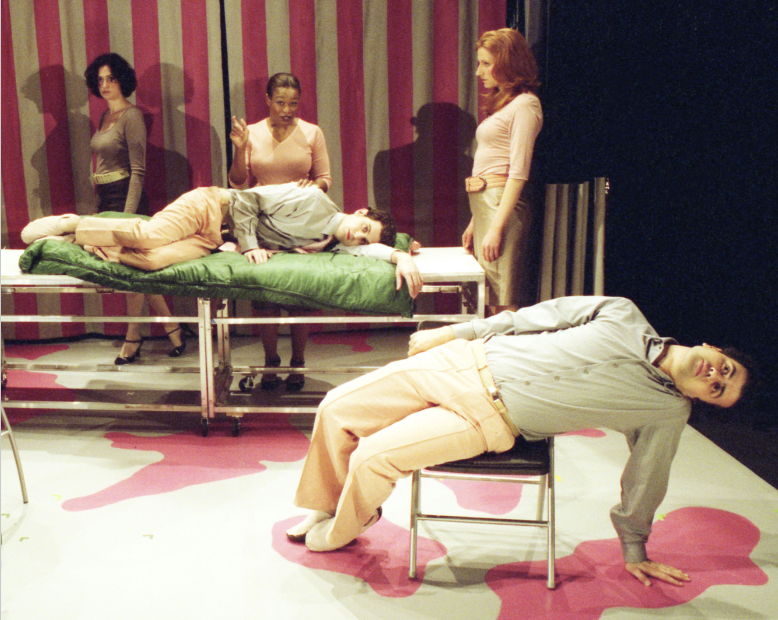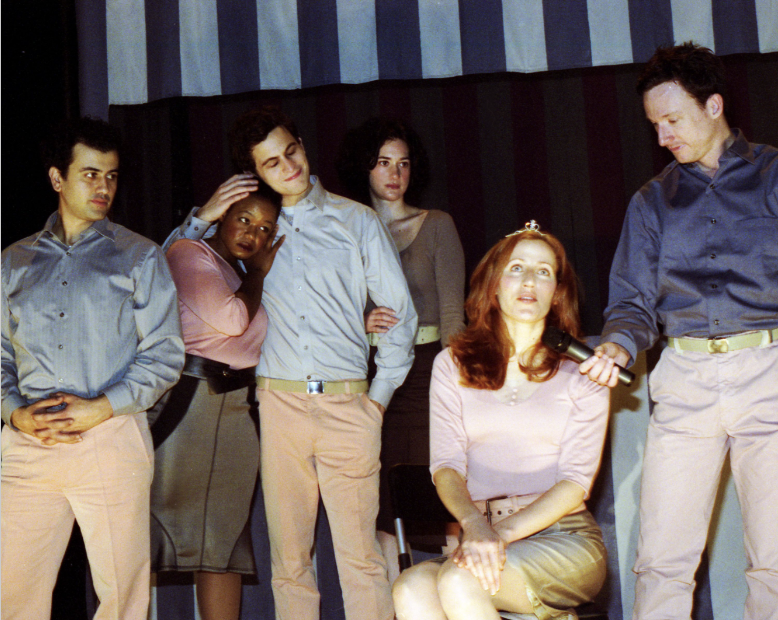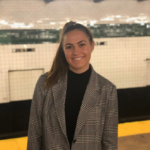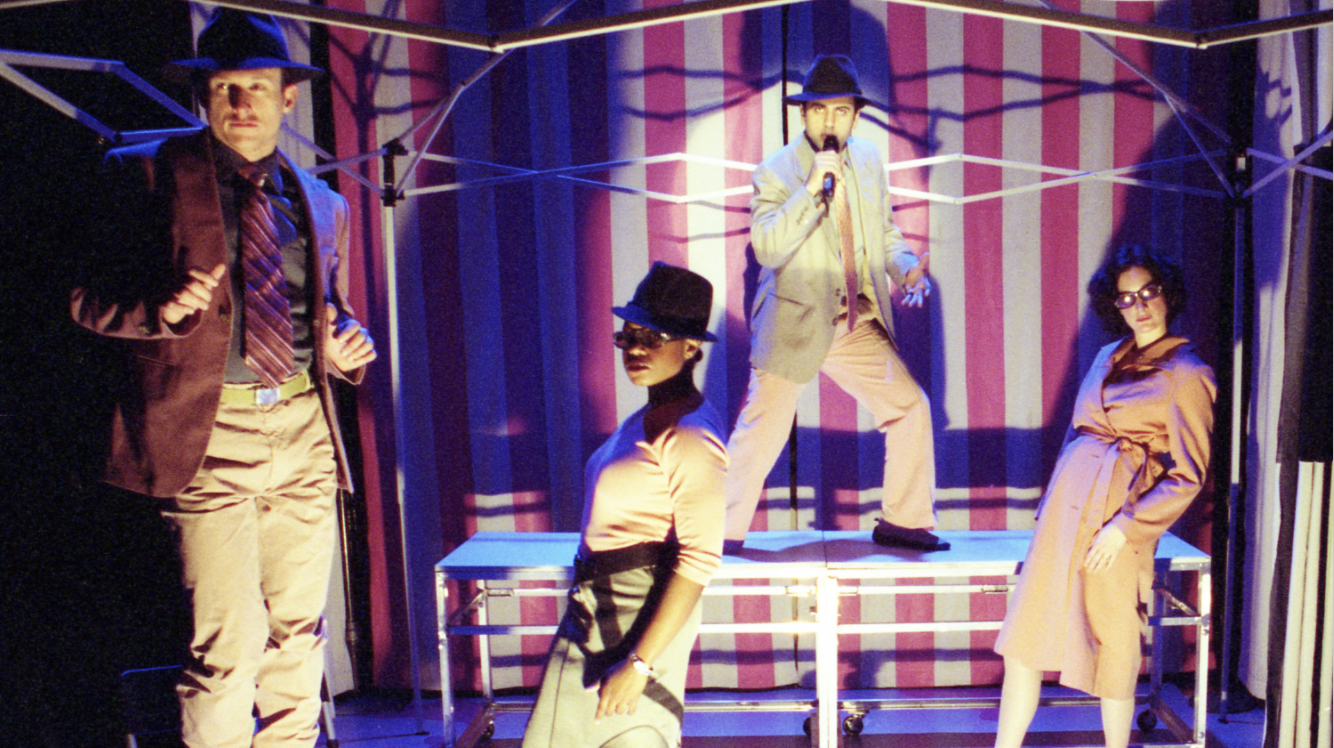How do we know what we know when nobody knows if everyone else is lying? What happens when the truth has lost its power to affect reality? Is there consensus reality? In the age of Kellyanne Conway’s “alternative facts” and widespread fake news, these questions seem to increasingly permeate the American psyche. For The Civilians’ Artistic Director Steven Cosson, founding Associate Artist Michael Friedman, and an ensemble of actor-devisers, remarkably, these concerns were worthy of dramatic exploration all the way back in 2003, an entire year before Donald Trump first graced television screens as the host of The Apprentice. With (I Am) Nobody’s Lunch, an exploration of the ways Americans parsed reality in the early aughts, this team of creators affirmed that while total truth may be an illusion, it is still possible to acknowledge that things are really bad and take action to make them better.
The early stages of Nobody’s Lunch— aptly subtitled A Cabaret About How We Know What We Know When Nobody Knows If Everyone Else Is Lying And When Someone Or Something Wants To Have You For Lunch—took place during the lead up to the Iraq War: the Bush Administration claimed Iraq had weapons of mass destruction, President George W. Bush ordered a U.S.-led airstrike campaign of “shock and awe” on the Iraqi capital in March, and, despite the President’s claim that all major combat operations had ended in Iraq during his infamous “Mission Accomplished” speech on May 1, 2003, the war in Iraq continued for nearly nine more years, leaving tens of thousands of civilians and soldiers dead and irrevocably deepening the divide not only between Democrats and Republicans, but between truth and conspiracy. The Civilians had recently premiered Gone Missing, a musical centered on the concept of lost items, which was “an indirect response to the grief and loss of 9/11,” said Cosson, but, amidst the turmoil of the developing war, the company wanted to do something more specifically engaged with the politics of the time.

“Steve and Michael were interested in how we get our information and how we believe what we believe,” recalled KJ Sanchez, a director, playwright, and member of the initial Nobody’s Lunch team. This emphasis on the formation of knowledge was no accident: Nobody’s Lunch was the third Civilians show to come out of a company-based, interview-centric devising process, and the company had learned some lessons along the way. “We didn’t even have the phrase ‘investigative theater’ yet,” said Cosson, “But we knew that the investigation needed to center on a question, and that question needed to be something that we did not have an answer for.” Furthermore, Cosson and the collaborating company wanted to focus on a question that could yield a multiplicity of answers and put its creators in a space of curiosity. As Cosson states in The Civilians: An Anthology of Six Plays, “What’s the point of making a show about what we already know?”
Once the company landed on a central inquiry—how fellow citizens were making sense of the manipulation of facts coming from the Bush administration and the larger media landscape—they got to work on their investigative process. Background interviews were conducted with people in the media to help build the intellectual framework for the project, potential interviewees were brainstormed, and a relevant pop cultural litmus test to be asked of all the subjects was cultivated: “Is Tom Cruise gay?”
“We knew that the investigation needed to center on a question, and that question needed to be something that we did not have an answer for.”
Steve Cosson
Like so many Civilians projects that combine the creative process with field research, the company was wary that there must be a difference between creating art and creating journalism; even theatre with a journalistic aspect to it ultimately still needs to be theatre. One way to avoid this pitfall was with Cosson’s interviewing process, a method influenced by London’s Joint Stock Theatre Company. “Their ethos was that you don’t write anything down,” recalled actor Matt Maher, a member of the Nobody’s Lunch company. “You talk with people, you sit there and you listen, you say as little as possible, and once the interview is over you write down everything from memory. It’s a second layer of interpretation.” The process is not easy, Maher admitted, “It’s incredibly difficult. It requires a level of presence and focus that is super intense. The interview itself is a creative event. You have to be present for yourself and for the interviewee.”
That level of presence was vital for Maher’s conversation with a former standup comedian, identified throughout Nobody’s Lunch as the “Channeler,” who claimed she could route an alien spirit, known as the “Entity,” though herself. 17 years after the creation of Nobody’s Lunch, Maher could still uncannily recall the story the Entity told of the Annunaki, spirit creatures who feed off the energy of fear and encourage humans to live in a state of panic. Near the end of the musical, the Entity provides the title’s inspiration when it emboldens humans to resist the bait of the Annunaki, “You must exert your free will. So, the next time you feel this anxiety, this fear energy in your body you must stop and say out loud, ‘NO. I am nobody’s lunch today.’”
The company experienced the complexities of conspiracy theories for themselves when Maher first presented his interview with the Entity. “This narrative is such a mind-blowing story,” said Maher. “When I performed it everybody in the cast just sat there with a stunned expression. Everybody was like… I kind of believe it. It’s not that I believed it… but it is maybe the closest I will come to a conversion narrative. I do feel like it really packaged ideas I knew in such a clear way. It was undeniable. So brilliant it might be true.”
Another alarming interview that became central to the plot of Nobody’s Lunch was with a high-level employee at Homeland Security. “It was the nascent stage of Homeland Security and this person was just plucked from the IRS,” recalled Sanchez, who conducted the interview. “That’s who filled those jobs in the beginning of the department… the government turned to the IRS and picked people who had been rising in the ranks there. She told me stories about how bonkers the whole thing was. Essentially, she was a policy wonk, a person who works at a desk, and now she was working with CIA guys. One guy pulled out his gun at a meeting as a chest-thumping gesture. Yes,” Sanchez conceded, “One of the reasons I fell in love with this process is that people will tell you anything as long as you really listen.”

When enough interviews had been conducted, the company embarked on a month-long residency at The Public Theater in August of 2003. The group would present their interviews and give feedback on structure, and Friedman would listen to the material and return the next day with songs inspired by the interviews. “His songs were a further distillation, a tasty morsel from the interview turned into a song,” said Maher. “As with the best of the Civilians shows, creatively he would be able to articulate in the songs the things emotionally that we were actually trying to say.”
A substantial goal of The Public workshop was to figure out how to thread all of the interviews together. Sanchez, who went on to found American Records, an investigative theatre company of her own, noted that each research-driven show has, “its own compass for how much verisimilitude you want and how much entertainment you want.” The trouble in piecing Nobody’s Lunch together, she believes, was that “the real material had a relationship to gravity that the fictional material did not. It was hard to marry these tones.” The answer ended up laying in the company itself: “To have such playful people doing these investigations was a delightful approach,” said Sanchez. “People in the room wanted to make something playful and something theatrical.”
As with the best of the Civilians shows, creatively (Friedman) would be able to articulate in the songs the things emotionally that we were actually trying to say.
Matt Maher
Building off of the momentum of The Public workshop, (I Am) Nobody’s Lunch was presented at Performance Space 122 in 2004 and then reworked at the Sundance Institute Theatre Program before receiving its world premiere at New York City’s 59E59 Theaters in 2006. The show then embarked on an American tour, making stops in Philadelphia and at the A.R.T in Cambridge before hopping the pond to participate in the Edinburgh Fringe Festival, where it won a coveted Fringe First Award. After a London premiere at Soho Theatre, (I Am) Nobody’s Lunch was made available to the world when Oberon Books published it in 2007.
17 years later, the ideas at the heart of (I Am) Nobody’s Lunch have only become more urgent. Facebook’s creation has staggeringly altered the information we consume, and, looking back, Cosson acknowledged a blind spot in his musical: “I think one thing that we didn’t see was the influence of social media and the internet on the question of consensus reality.” Still, the truths revealed in Nobody’s Lunch hold even more weight today than they did in 2003. A common understanding of what is actually taking place in the world may never be reached, but Nobody’s Lunch assures us that this shouldn’t deter us from insisting on truthfulness. Perhaps we can all take some parting wisdom from the Entity: “There is no absolute truth. There is only authenticity.”
Listen to excerpts from the show recorded for The Civilians’ Let Me Ascertain You podcast in 2012:
To listen to the world premiere cast recording of (I Am) Nobody’s Lunch, click here.
To learn more about The Civilians and to access exclusive discounts to shows, visit our website TheCivilians.org.
Author
-

Caroline Meredith is the Editorial and Social Media Intern for The Civilians and a student at NYU's Gallatin School of Individualized Study (BA '22), where she is concentrating on arts administration and writing. She previously served as the editorial intern for American Theatre magazine and their publisher, Theatre Communications Group. As a general management intern, she assisted Martian Entertainment with "The Play That Goes Wrong" Off-Broadway and the 2019 Broadway transfer of "The Lightning Thief." At NYU, she was a producer of the 2020 Gallatin Arts Festival and a student editor and frequent contributor to Confluence, NYU Gallatin's online platform for student writing, art, and research.
View all posts









